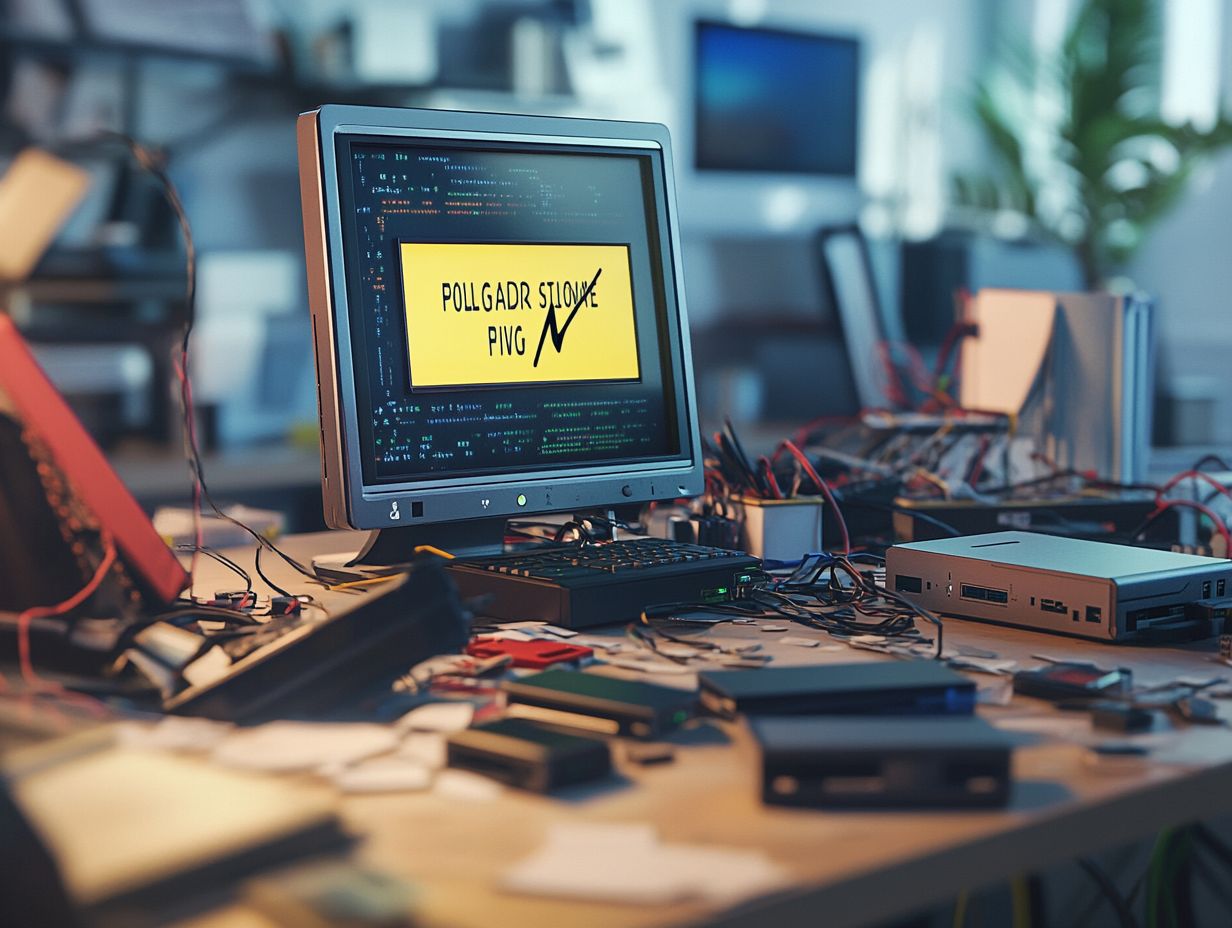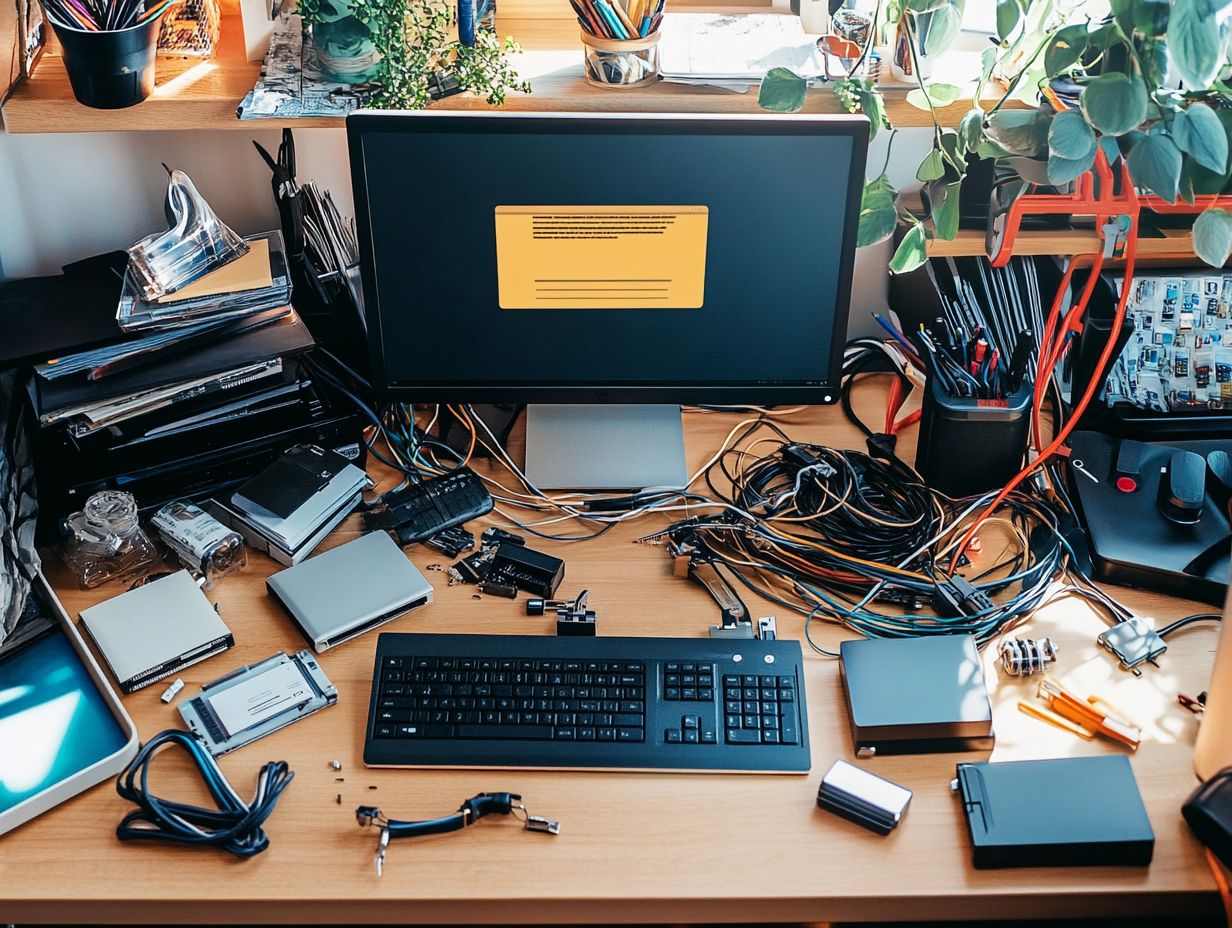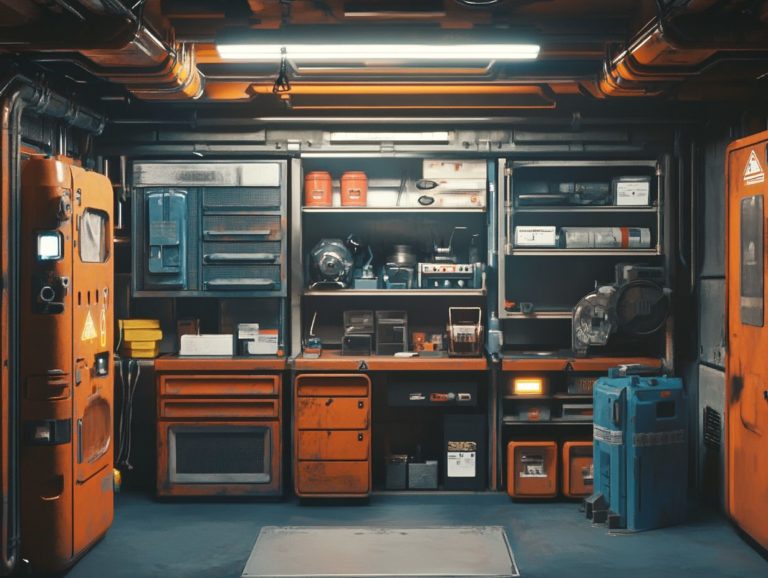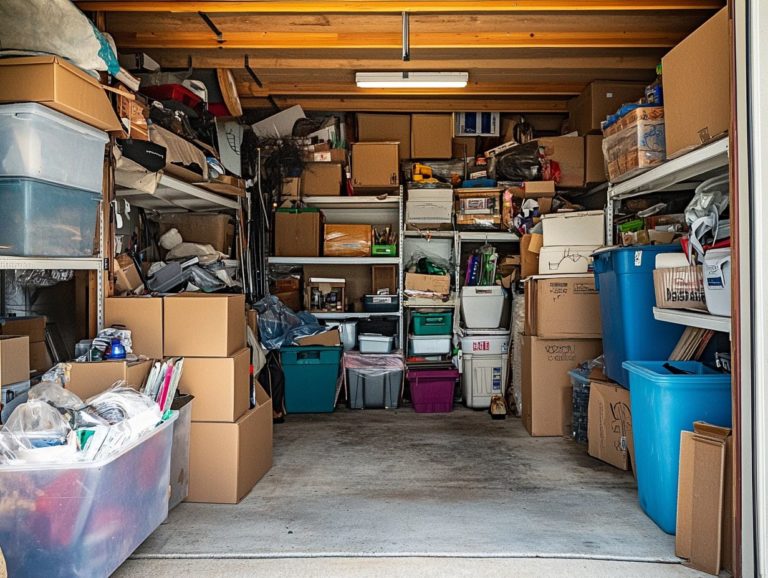5 Signs You Need to Upgrade Your Storage
In today’s digital landscape, efficient storage management is essential for achieving both personal and business success.
If your computer is lagging or you find yourself constantly shuffling files to create more space, it may be time to reassess your storage solutions.
This article outlines five key signs that signal an upgrade is in order, along with valuable insights into various storage options, critical considerations for making an informed choice, and practical tips for effective management.
Discover the strategies to optimize your digital space, ensuring that your files remain accessible and secure at all times.
Contents
- Key Takeaways:
- 1. You Are Running Out of Storage Space
- 2. Your Computer is Running Slowly
- 3. You Can’t Install New Software or Updates
- 4. You Are Constantly Deleting Files to Free Up Space
- 5. Your Files Are Not Backed Up Properly
- What Are the Different Types of Storage Options Available?
- Frequently Asked Questions
- What are some signs that indicate I need to upgrade my storage?
- How can slow performance signal a storage upgrade?
- Why is low storage space a clear upgrade signal?
- What do frequent crashes mean for your storage?
- How does difficulty accessing files indicate a storage upgrade?
- Why is outdated technology a sign to upgrade your storage?
Key Takeaways:

- Running out of storage space is a clear sign that it’s time to upgrade. Act now to avoid losing your important files!
- A slow computer often indicates that your storage is struggling to keep up. Consider upgrading for improved performance.
- If you can’t install new software or updates, it’s a sign that your storage is not enough and needs an upgrade.
1. You Are Running Out of Storage Space
If you re feeling overwhelmed by cluttered rooms brimming with unnecessary items, it s a strong indication that you may be running out of storage space, especially in critical areas like your garage or closet in New Braunfels.
Embracing efficient storage solutions can help alleviate this issue. It can also serve as the perfect opportunity to declutter your living space.
This buildup affects your home’s appearance. It can also create chaos, making it hard to find what you need. A highly effective strategy to combat clutter is to utilize self-storage facilities, which are places where you can rent space to store your things.
Professional moving companies can help you efficiently organize and transport your items. This ensures a seamless transition as you reclaim your home s organization and comfort, making space for what truly matters.
2. Your Computer is Running Slowly
A sluggish computer often stems from not enough storage space, especially when your hard drive is bogged down with files and applications that demand more resources than what’s available.
As your hard drive approaches capacity, it struggles to allocate space effectively for new and essential processes. This results in notable performance delays.
Tasks such as loading applications or saving documents can become exasperatingly slow. To alleviate these issues, you can optimize your storage by regularly clearing out unnecessary files think temporary downloads and old backups.
Utilizing external drives or cloud storage which allows you to save files online instead of on your computer for data you don t access frequently can also free up valuable space, enhancing your computer s overall speed and efficiency.
In the end, consistent maintenance is key to ensuring your hard drive performs at its peak.
3. You Can’t Install New Software or Updates
Not enough storage space can leave you grappling with the frustrating inability to install new software or updates, as your device struggles to allocate the necessary resources for these essential enhancements.
This limitation can significantly hinder your overall functionality, leading to slow performance, unexpected system crashes, and an unsatisfactory user experience. When updates are delayed or unavailable, security vulnerabilities may linger, putting your sensitive data at risk.
You can tackle these issues by regularly cleaning your disk, removing unnecessary files, and taking advantage of external storage options like cloud services or USB drives.
Consider disabling automatic updates or selectively choosing which updates to install. This approach can help you manage disk space more effectively, ensuring that your device runs smoothly and securely.
4. You Are Constantly Deleting Files to Free Up Space

Constantly deleting files to free up storage space can quickly spiral into a frustrating cycle. Many of those unnecessary items could be handled more effectively with a better storage option.
This need to delete files steals precious time and can lead to increased worry as important personal and business information might disappear without a trace. The worry of losing memories or important documents often lingers long after that hasty decision to delete. Instead of getting caught in this relentless cycle, consider exploring self-storage options as a viable alternative.
By utilizing these services, you can organize and securely store files, freeing up digital space while keeping essential backups readily accessible. This approach alleviates the stress associated with the constant need for digital decluttering and enhances your overall asset management.
5. Your Files Are Not Backed Up Properly
If you haven’t backed up your files properly, the limited storage space on your hard drive poses a big risk. It’s essential to implement a reliable backup solution to safeguard your important data.
Neglecting proper file backup can lead to severe data loss, especially when faced with hardware failure or unexpected disasters. By choosing cloud-based solutions or external drives, you can ensure that your important documents, photos, and projects are secure.
Set up regular backups to reduce the stress of losing data and allow you to focus on your tasks without the nagging fear of losing critical information. Creating redundant copies in different locations significantly enhances your data protection, providing an added layer of security and peace of mind.
Act now to protect your important files before it s too late!
What Are the Different Types of Storage Options Available?
Knowing your storage options can help you use your space better, whether at home or work, especially in areas like New Braunfels. Local solutions such as Space Valet can streamline the process.
For individuals, personal storage solutions offer a practical way to declutter your living space. They provide a secure place for seasonal items, sports equipment, and belongings during transitional periods like moving or renovating.
Businesses also face unique storage needs. Customized storage for inventory management allows you to maintain an organized supply of goods without sacrificing valuable retail or office space.
If you’re in e-commerce, specialized storage options can address the logistical challenges you face. They ensure efficient order fulfillment and smooth operations while accommodating fluctuating inventory levels.
Each of these solutions plays a vital role in alleviating space constraints, ultimately enhancing your productivity and comfort.
What Factors Should Be Considered When Choosing a Storage Upgrade?
Choosing the right storage upgrade needs careful thought about several factors that can significantly enhance space utilization, especially in a business environment where effective inventory management is key.
Beyond just size, which determines how much inventory or personal items you can store, accessibility is crucial. Consider how easily these storage options can be accessed during busy peak hours when efficiency is paramount.
Cost is another vital factor; striking a balance between affordability and quality is essential. You need solutions that offer long-term benefits without putting unnecessary strain on your budget.
Security features are also non-negotiable; ensuring that both personal belongings and sensitive business assets are safeguarded against theft or damage provides invaluable peace of mind.
These considerations serve as the foundation for crafting a storage strategy that effectively meets both personal and professional needs.
How Can a Business Determine If They Need to Upgrade Their Storage?

You can determine the need for a storage upgrade by carefully evaluating how you keep track of your products and whether your space utilization meets your operational demands.
When your inventory levels start to swell beyond the comfortable capacity of your existing setup, you might notice some telling signs of strain. Look for cluttered aisles, difficulties accessing frequently used items, or an overall sense of chaos creeping into your workspace.
If your team often struggles to locate products or spends too much time organizing materials, it s clear that your space isn t optimized for efficient workflow. Spotting these inefficiencies is crucial; they can skyrocket your operational costs and disrupt service, ultimately affecting customer satisfaction.
What Are the Potential Risks of Not Upgrading Storage?
Neglecting to upgrade your storage can open the door to a range of potential risks, including inefficient practices that waste space and impact both productivity and profitability.
When you overlook the need to assess your storage requirements, you create a situation where lost items become common. This can disrupt workflow and lead to frustration among your team members. The hours spent searching for misplaced resources can severely diminish overall efficiency, causing delays in critical processes.
As these inefficiencies pile up, you may see operational costs start to rise. Instead of implementing proactive storage management, you might end up investing in temporary fixes. Understanding the implications of inadequate storage will help you develop long-term solutions that enhance organizational effectiveness and protect your financial stability.
How Often Should a Business Upgrade Their Storage?
The frequency of your storage upgrades should depend on a careful evaluation of your inventory management needs and how swiftly your efficient storage solutions are being put to use. Several key factors are pivotal in this decision-making process.
As your company grows, you may find your current storage capacities increasingly stretched, signaling that an upgrade is essential. Seasonal fluctuations can also affect your inventory levels, prompting you to reassess your storage capabilities to ensure they can handle peak demands.
New technologies can offer better storage solutions that boost efficiency. This ever-evolving landscape necessitates that you periodically evaluate your storage strategies to maintain a competitive edge and agility in your operations.
What Are Some Tips for Efficiently Managing Storage Space?
Efficiently managing your storage space is essential for maintaining a well-organized home and avoiding the chaos of cluttered rooms. Embracing several practical tips can optimize your existing storage solutions effectively.
One of the most effective strategies is decluttering. Regularly assess your belongings and keep only what truly serves a purpose. This practice not only clears out unnecessary items but also creates a more serene environment.
Think vertically! By installing shelves or opting for tall furniture, you can free up valuable floor space while ensuring easy access to frequently used items.
Consider categorizing your belongings into designated zones such as seasonal, everyday, and rarely-used items. This approach makes each category easy to locate and ensures that everything finds its rightful place.
Frequently Asked Questions

What are some signs that indicate I need to upgrade my storage?
Is your system slow? Running out of space? Frequent crashes and difficulty accessing files are all signs that scream for a storage upgrade!
How can slow performance signal a storage upgrade?
If your computer is slow, it might be due to a full storage. When storage is full, your system struggles to find files, making everything lag.
Why is low storage space a clear upgrade signal?
Constantly low storage means you need more space. This prevents you from saving new files and risks losing important documents.
What do frequent crashes mean for your storage?
Frequent crashes often point to insufficient storage or outdated technology. If saving or accessing files causes crashes, consider upgrading your storage for better stability.
How does difficulty accessing files indicate a storage upgrade?
Struggling to access files may mean you need more storage or newer technology. This can frustrate you and hinder productivity.
Why is outdated technology a sign to upgrade your storage?
Older technology usually has limited storage and slower performance. Upgrading can help you meet modern computing demands and enhance your experience.















